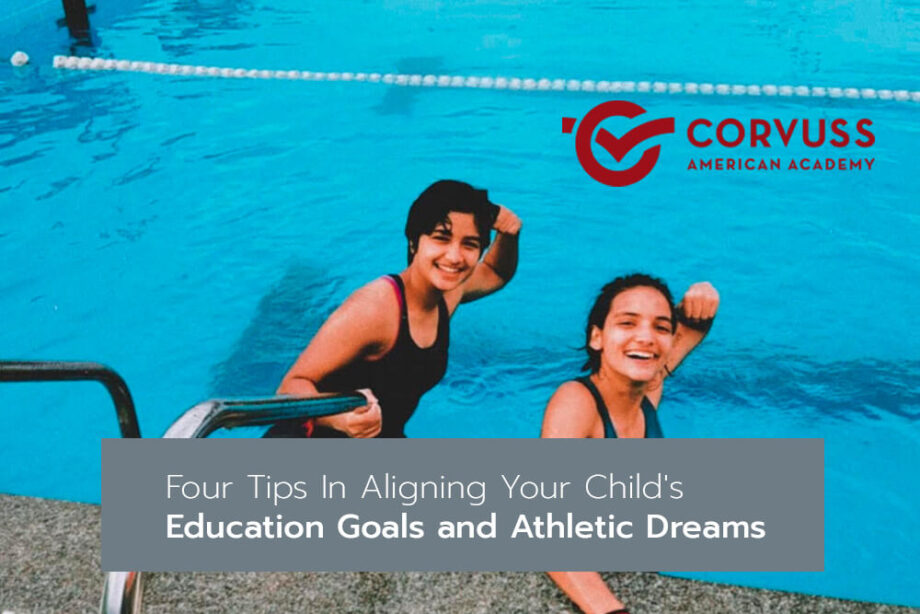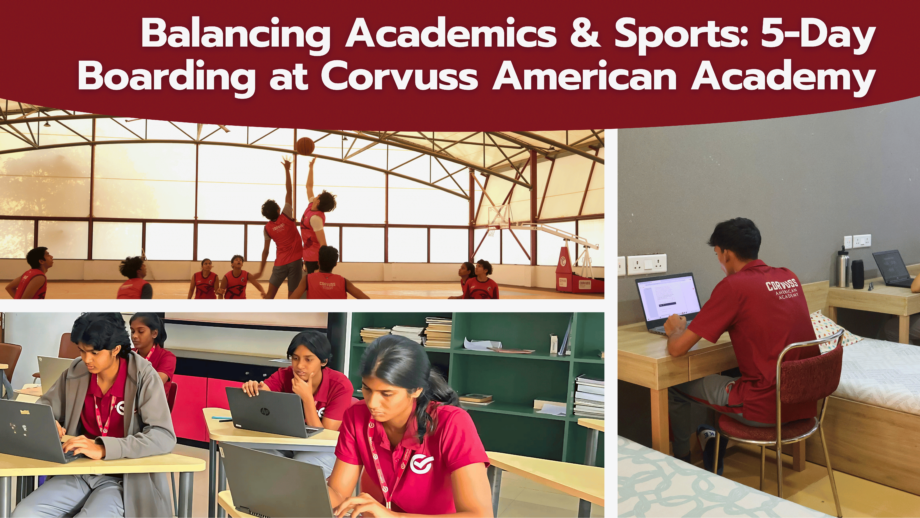Athletic and academic success are top priorities for many parents. After all, you want your child to thrive academically as they work hard to achieve their athletic dreams. Many complementary traits are necessary for a student-athlete to succeed in both the academic and athletic worlds. Dedication, time management, responsibility, and healthy habits are all critical components in the recipe for success.
Responsibility, confidence, and time management go hand in hand. As such, your child will need to understand what their goals are, how to meet them, and the importance of having a perspective that is simultaneously self-driven and realistic. Our American sports academy in India healthily emphasizes responsibility to help foster your child’s individuality while also helping them set their standards high.
At Corvuss American Academy, our staff collaborates with students to help them align their educational goals and athletic aspirations. As the first international boarding school in India specifically designed to accommodate the needs of student-athletes, we are committed to helping students develop their athletic abilities while also pursuing an internationally-recognized US academic curriculum. Our groundbreaking boarding school aims to change the landscape of academics and sports in India using a collaborative approach that maximizes your child’s potential in the classroom and on the playing field.
During this crucial time in the life of your developing youngster, the habits, skills, and talents that are nurtured and emphasized will significantly impact the course of their life. As such, combining mental and physical agility can give your child the competitive edge needed to push past their limitations.
With that in mind, here are four tips to help your child align their educational goals and athletic dreams during these critical formative years.
Tip 1: Foster a Positive Educational Philosophy

Having a positive academic mindset is incredibly important. Does your youngster think of themselves as a student-athlete or an athlete that is also a student? Neither sports nor academics can be the only focus. Instead, a positive balance between educational and physical performance must be attained. Your child must understand that both components are necessary for a bright future filled with possibilities. After all, intellectual ability and physical performance can open doors for your child worldwide.
Therefore, your child must value their academic objectives as highly as their athletic ones. The amount of time your student spends hitting the books is just as important as how many laps they run, laps they swim, or goals they score. Are your children in an environment where teachers can help them strike a healthy balance between academic and athletic success?
Your child must develop an identity that stretches far beyond being an athlete. Although taking pride in athletic accomplishments is important, there is also a considerable amount of pride in achieving academic success. You should help your child get excited about reaching and surpassing their educational and sports goals. Parents should be just as enthusiastic about an A+ on a calculus test as winning a cricket game.
- Praise academic and athletic achievement equally
- Encourage an intellectual mindset
- Remind your student that knowledge is an asset
Tip 2: Teach Time Management, Organization, and Responsibility

Your child is sure to face many challenges academically and athletically as they complete high school and college. One of the biggest challenges that student-athletes must confront is time management. In fact, many would say that this is one of the most challenging parts of being a student-athlete.
Few teens inherently possess the ability to manage their time to balance their everyday social, physical, and intellectual demands. Not to mention, student-athletes have much more to contend with than non-athletes in high school. From intense conditioning and practices to long seasons with competitions and travel, it can be difficult for student-athletes to find time to study. Your student will need to learn how to set aside activities that are a waste of time.
Take the time to remind your students about the importance of time management and nurturing their primary responsibilities. Teach your child to recognize the difference between advantageous and unproductive activities. Then, help your student set a schedule. From the moment they wake up to the time they go to bed, every hour should be used as productively as possible. Schedule appropriate time for leisure and fun, but also remember that work comes before play. As a competitive athlete and academic scholar, your child has two significant positions to cultivate.
Suggest the use of a planner, PTA, or pocket organizer. Or, encourage your student to begin each day by listing the things they must accomplish. Seeing the tasks to be completed in a day will help your child learn to manage every hour productively. Repetition is key to forming habits. The more your student gets used to doing repetitive activities every day, the easier it will be for them to integrate these behaviors naturally. Have your student make a list of their goals and chart their progress.
- Foster habits of responsibility and dedication
- Teach your child how to prioritize beneficial activities
- Purchase students a planner or PDA
- Teach task management
- List out priorities daily
- Set goals and chart progress with your student
The above items are what built the foundation of Corvuss American Academy. We designed our schedule and US curriculum around providing holistic development of student-athletes so they can succeed in every aspect of their studies.
Tip 3. Encourage Healthy Habits

Healthy habits are also critical. You will need to help your student develop wellness practices of healthy sleeping, eating, and a balanced mindset. Getting enough sleep is essential to physical and mental growth, and healing and recovery occur during the sleep cycle. Nutrition is also essential for physical and mental well-being.
It is also vital to teach your children about overall physical and mental health. Your student should learn to respect their mind and body. When injured, they need to be confident enough to seek help from a professional. Physical injuries should not be taken lightly, and athletes must care for their bodies and minds.
With that being said, emotional trauma should be addressed as well. While no athlete wants to appear weak, if your student is having an issue and needs to discuss their problems and concerns, be sure that they can speak with a trusted adult.
- Be sure teens get enough sleep
- Teach youngsters to seek professional help if injured
- Address mental health and wellness in children
- Educate youth on how to consume proper nutrition
- Ensure students respect their minds and bodies
At Corvuss American Academy, our campus provides many resources for student-athletes, including psychologists, nutritionists, as well as strength and conditioning specialists.
Tip 4: Avoid Superficial Gratuities

Indulging children with extrinsic rewards can be tempting for parents. After all, extrinsic rewards give an athlete something to work for. Buying your student a gift if they get the targeted grade point average can also be alluring. However, these rewards could ultimately cause student-athletes to lose motivation. Your student-athlete should work for the feeling of accomplishment instead of a short-term reward.
- Avoid using monetary or extrinsic reward systems
- Foster a sense of inner accomplishment
- Remind students of the intrinsic value of success
Corvuss American Academy Encourages Academic and Athletic Excellence
At Corvuss American Sports Academy, we work with students and parents to create the ideal environment for physical and mental growth. Our skilled team of experts can help your student learn to balance academics and athletic performance in an advantageous environment that supports the development of their natural talents while also imparting learning and knowledge. From our swimming and tennis programs to our football and basketball NCAA academy, we offer the mechanisms of victory that student-athletes need to thrive, excel, and flourish.






